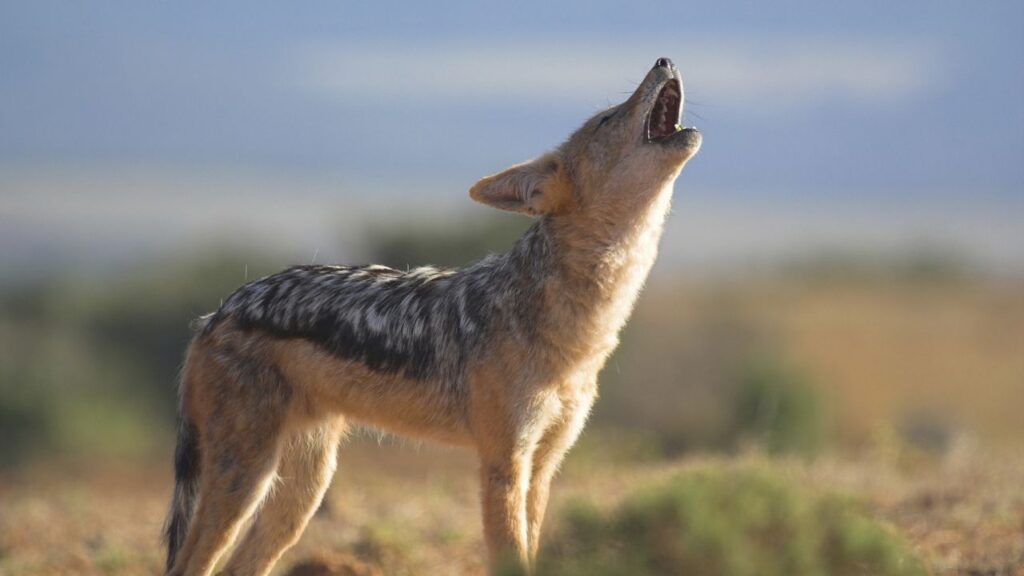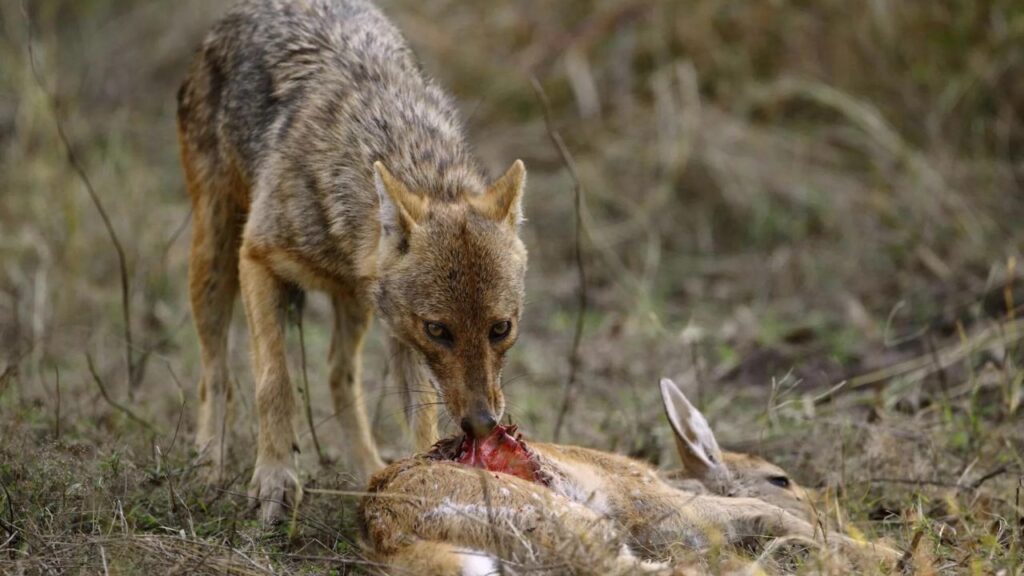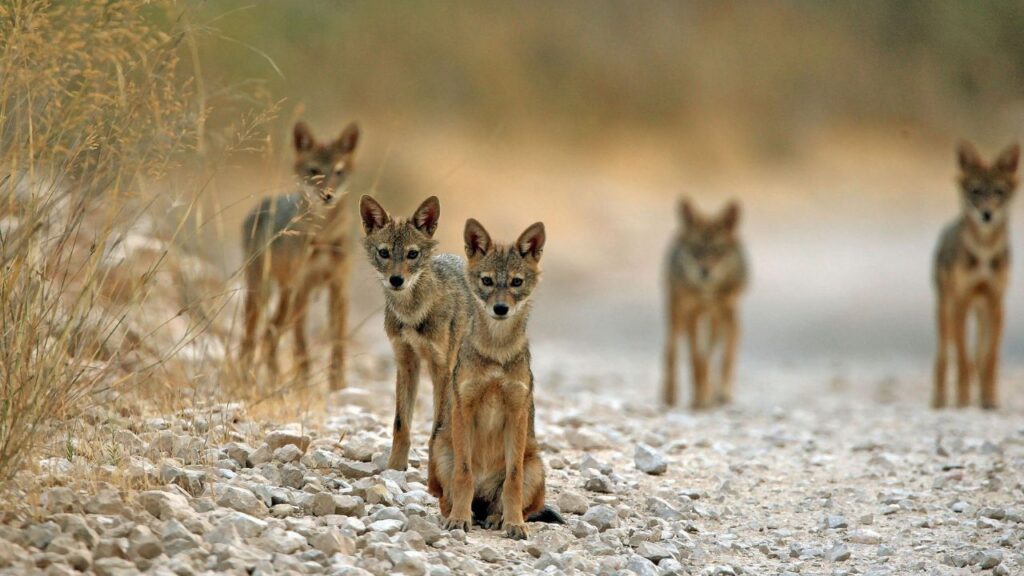Do Jackals Attack Humans? Jackals rarely attack humans, typically avoiding them, but they may become aggressive if threatened or cornered.
Jackals, with their cunning nature and adaptable behavior, have long been subjects of intrigue and misunderstanding.
These wild canids, often portrayed in folklore as clever tricksters, are native to various regions across Africa, the Middle East, and South Asia.
While jackals are generally shy and avoid human contact, concerns about their potential threat to humans have emerged, particularly in areas where their habitats overlap with human settlements.
This article explores the behavior of jackals, the circumstances under which they might attack humans, and the steps you can take to minimize the risk of such encounters.
Contents
What Are Jackals?
Species Overview
Jackals belong to the genus Canis, which also includes wolves, coyotes, and domestic dogs. [Do Jackals Attack Humans?]
There are three main species of jackals: the golden jackal (Canis aureus), the black-backed jackal (Canis mesomelas), and the side-striped jackal (Canis adustus).
- Golden Jackal: The most widespread species, the golden jackal, is found in regions spanning from Southeastern Europe to South Asia. It is highly adaptable and thrives in various environments, from forests to deserts and even human-dominated landscapes.
- Black-Backed Jackal: This species is native to sub-Saharan Africa, particularly in countries like South Africa, Namibia, and Kenya. The black-backed jackal is easily recognized by the distinctive black saddle of fur running along its back.
- Side-Striped Jackal: Found primarily in central and southern Africa, the side-striped jackal prefers wooded and marshy areas. It is less aggressive and more reclusive compared to the other two species.
Habitat and Geographical Distribution
Jackals inhabit diverse environments, ranging from arid deserts and savannas to forested areas and wetlands. [Do Jackals Attack Humans?]
They are often found in regions where food is abundant, including near human settlements where they scavenge on garbage and leftovers.
This proximity to humans has increased the likelihood of encounters, particularly in areas where their natural habitats have been encroached upon by urban development.
Behavior and Diet
Natural Behavior in the Wild
Jackals are primarily nocturnal, being most active during the night and early morning hours. They are known for their scavenging behavior, often feeding on the remains of other animals’ kills.
However, they are also opportunistic hunters, preying on small mammals, birds, reptiles, and insects. Jackals are social animals, often living in monogamous pairs with their offspring.
They communicate through a series of vocalizations, including yips, howls, and growls, which they use to mark their territory and coordinate with their pack.
Typical Diet and Its Impact on Human Encounters
The diet of jackals consists mainly of small animals, but they are not above scavenging for food in human settlements, particularly when natural prey is scarce.
This scavenging behavior can lead to increased contact with humans, especially in areas where waste is not properly managed.
While they typically avoid humans, the presence of food can sometimes lure them closer, leading to potential conflicts. [Do Jackals Attack Humans?]

Do Jackals Attack Humans?
Incidence of Attacks
Jackal attacks on humans are relatively rare, especially compared to other wild animals like wolves or hyenas.
However, there have been documented cases of jackals attacking humans, particularly in regions where they come into close contact with people. These incidents are often isolated and typically involve jackals that are either rabid or feel threatened.
In countries like India and parts of Africa, where jackals live near human settlements, there have been sporadic reports of jackals attacking humans.
However, such incidents are rare, and the majority of jackals are more likely to flee than to fight when confronted by humans. [Do Jackals Attack Humans?]
Regions Where Such Incidents Are More Common
Jackal attacks are more commonly reported in regions where their habitats overlap with densely populated human areas. In parts of Africa and India, where human encroachment on wildlife habitats is significant, the likelihood of such encounters increases.
These regions also tend to have higher incidences of rabies, which can contribute to the occurrence of jackal attacks. [Do Jackals Attack Humans?]
Reasons for Aggression
Situations Where Jackals Might Become Aggressive
Jackals are generally not aggressive towards humans, but there are certain situations where they might exhibit aggressive behavior:
- Rabies: Rabies is one of the primary reasons a jackal might attack a human. Infected jackals lose their natural fear of humans and can become highly aggressive. Rabid jackals are unpredictable and pose a significant danger to humans and other animals.
- Food Scarcity: In times of food scarcity, jackals may venture closer to human settlements in search of food. When food is limited, their natural caution may be overridden by hunger, leading to bolder behavior and potential conflicts with humans.
- Defensive Behavior: If a jackal feels threatened or cornered, it may attack in self-defense. This is more likely to occur if a jackal is injured or if humans inadvertently get too close to a jackal’s den or young.
Role of Habitat Encroachment by Humans
As human populations expand and encroach upon natural habitats, wildlife, including jackals, is forced into closer contact with people. [Do Jackals Attack Humans?]
Urbanization, deforestation, and agricultural expansion reduce the availability of natural prey and habitats for jackals, increasing the chances of encounters with humans.
This encroachment not only disrupts the natural behavior of jackals but also heightens the risk of conflicts, as jackals may venture into human settlements in search of food or shelter.

Comparison with Other Wild Animals
How Jackal Attacks Compare to Those by Other Wild Animals
Compared to other wild animals like wolves, hyenas, or even domestic dogs, jackal attacks on humans are significantly less common.
Wolves and hyenas are larger and more powerful predators with a higher likelihood of viewing humans as prey in desperate situations. Jackals, being smaller and more solitary, typically avoid direct confrontation with humans.
However, the perception of danger posed by jackals can sometimes be exaggerated due to their scavenging behavior and occasional proximity to human settlements.
In reality, jackals are more likely to flee than fight when faced with a human, making them less of a threat compared to more aggressive wild animals. [Do Jackals Attack Humans?]
Perception Versus Reality of the Danger Posed by Jackals
The fear of jackals is often rooted in cultural myths and misunderstandings about their behavior. While they are capable of inflicting harm, particularly if rabid or threatened, jackals are not naturally inclined to attack humans.
The perceived danger often outweighs the actual threat, especially when compared to other wild animals. Educating the public about jackal behavior can help reduce unnecessary fear and promote coexistence between humans and wildlife.
Are Jackal Attacks Dangerous?
Severity of Attacks
The severity of a jackal attack can vary depending on the circumstances. While jackals are smaller and less powerful than other canids, their bites can still cause significant injuries, particularly if the jackal is rabid.
The most severe consequence of a jackal attack is the potential transmission of rabies, a deadly viral disease that affects the nervous system.
In some cases, jackal attacks have resulted in serious injuries, particularly in children or individuals unable to defend themselves. [Do Jackals Attack Humans?]
However, fatalities are extremely rare, and most attacks result in non-fatal injuries that can be treated with prompt medical attention.
Case Studies or Examples of Serious Incidents
There have been documented cases where jackal attacks have led to serious consequences, particularly in regions with high rabies prevalence.
For instance, in parts of India and Africa, where rabies is more common, there have been reports of rabid jackals attacking humans, resulting in serious injuries and, in some cases, fatalities due to rabies.
In one incident in India, a rabid jackal attacked several people in a village, leading to widespread panic and the eventual culling of the jackal to prevent further attacks.
This highlights the importance of rabies prevention and the need for awareness in regions where jackals and humans coexist. [Do Jackals Attack Humans?]

Preventive Measures
Tips on Avoiding Jackal Encounters
- Avoid Active Areas: Stay away from areas where jackals are known to be active, especially during dawn and dusk when they are most likely to be hunting or scavenging.
- Secure Food Sources: Jackals are attracted to food, so it’s essential to secure garbage bins, compost piles, and pet food to prevent attracting them to your property. [Do Jackals Attack Humans?]
- Keep Pets Indoors: Pets, especially small ones, can be at risk of jackal attacks. Keeping pets indoors during the night and supervising them when outside can reduce the risk.
- Stay Calm: If you encounter a jackal, stay calm and avoid making sudden movements. Slowly back away while maintaining eye contact, and make loud noises to scare the jackal away.
Safety Measures to Take if Confronted by a Jackal
- Do Not Run: Running can trigger a predator’s chase instinct. Instead, stand your ground, make yourself appear larger, and make loud noises to deter the jackal.
- Use a Deterrent: Carrying a deterrent, such as a whistle, flashlight, or even a stick, can help protect you if you encounter a jackal. Shining a bright light in the jackal’s eyes or blowing a loud whistle can startle it and cause it to flee.
- Seek Shelter: If a jackal shows signs of aggression, seek shelter in a nearby building or vehicle if possible. Creating a physical barrier between yourself and the jackal can prevent an attack.
How to Respond to a Jackal Encounter
Immediate Actions
If you encounter a jackal in the wild or in an urban area, take the following steps:
- Assess the Situation: Determine whether the jackal poses an immediate threat. If the jackal is simply passing through, it may not pose any danger and can be left alone.
- Do Not Approach: Never attempt to approach or feed a jackal. Keep a safe distance and avoid any actions that could be perceived as threatening. [Do Jackals Attack Humans?]
- Report Aggressive Behavior: If the jackal is behaving aggressively or appears rabid, contact local wildlife authorities or animal control immediately. They can assess the situation and take appropriate action.
Steps to Take if a Jackal Shows Signs of Aggression
- Stand Your Ground: Do not turn your back or run. Stand tall, make yourself appear larger by raising your arms, and make loud noises to scare the jackal away.
- Use Deterrents: If you have a flashlight, shine it in the jackal’s eyes. Loud noises, such as clapping or yelling, can also help deter the animal.
- Retreat Slowly: If the jackal continues to approach, retreat slowly while facing the animal. Do not make any sudden movements that could provoke an attack.
Long-Term Solutions
Community Actions to Reduce Jackal-Human Conflicts
Communities in regions where jackals are common can take several steps to reduce the risk of conflicts:
- Education and Awareness: Educating residents about jackal behavior and the risks of rabies can help prevent unnecessary fear and promote coexistence. [Do Jackals Attack Humans?]
- Proper Waste Management: Implementing proper waste management practices, such as securing garbage bins and reducing food waste, can help keep jackals away from human settlements.
- Rabies Vaccination Programs: In areas where rabies is prevalent, vaccination programs for domestic animals and public awareness campaigns can help reduce the risk of rabies transmission.
Role of Wildlife Conservation in Managing Jackal Populations
Wildlife conservation plays a crucial role in managing jackal populations and preventing conflicts with humans. Conservation efforts can include:
- Habitat Preservation: Protecting and restoring natural habitats can help reduce the need for jackals to venture into human settlements in search of food.
- Population Control: In regions where jackal populations have grown too large, wildlife management authorities may implement population control measures to reduce the risk of conflicts.
- Research and Monitoring: Ongoing research and monitoring of jackal populations can provide valuable data on their behavior and movements, helping to inform conservation and management strategies.
Final Verdict
While jackals are generally not a threat to humans, certain circumstances, such as rabies or food scarcity, can lead to aggressive behavior.
Understanding jackal behavior and taking preventive measures can significantly reduce the risk of encounters. By respecting wildlife and promoting coexistence, humans and jackals can share the same environment with minimal conflict.
See Also: Do Blacktip Sharks Attack Humans? The Hidden Danger!
FAQs
Can jackals be domesticated?
No, jackals are wild animals and are not suitable for domestication. They are best left in their natural habitats.
Do jackals carry diseases that can affect humans?
Yes, jackals can carry diseases such as rabies, which can be transmitted to humans through bites or scratches. [Do Jackals Attack Humans?]
Are jackals more dangerous in urban areas?
Jackals can pose a greater risk in urban areas where they come into close contact with humans, especially if they are scavenging for food or if rabies is prevalent.
How common are jackal sightings near human settlements?
Jackal sightings near human settlements are becoming more common, particularly in regions where natural habitats have been encroached upon by urban development.
What should you do if bitten by a jackal?
If bitten by a jackal, seek medical attention immediately. Wash the wound thoroughly with soap and water and contact local health authorities, especially if rabies is suspected.
Conclusion: Do Jackals Attack Humans?
In conclusion, while jackals are generally not a direct threat to humans, there are specific situations where they can become dangerous.
By understanding their behavior, taking preventive measures, and promoting wildlife conservation, we can minimize the risk of jackal attacks and ensure a peaceful coexistence with these intriguing creatures.
Remember, respecting wildlife and staying informed about local animal behavior is key to reducing conflicts and protecting both humans and animals.

Hello, I am Rosa Ellis, a mother of two and a wildlife blogger. I grew up in New York City, but I love exploring forests. I’ve traveled to places like Yellowstone National Park and the Amazon Rainforest to see animals up close. I know a lot about animal behavior and which animals can be dangerous to humans. Thanks for visiting my blog!

